Lochhead on Marketing
189 The Big Distribution Lie
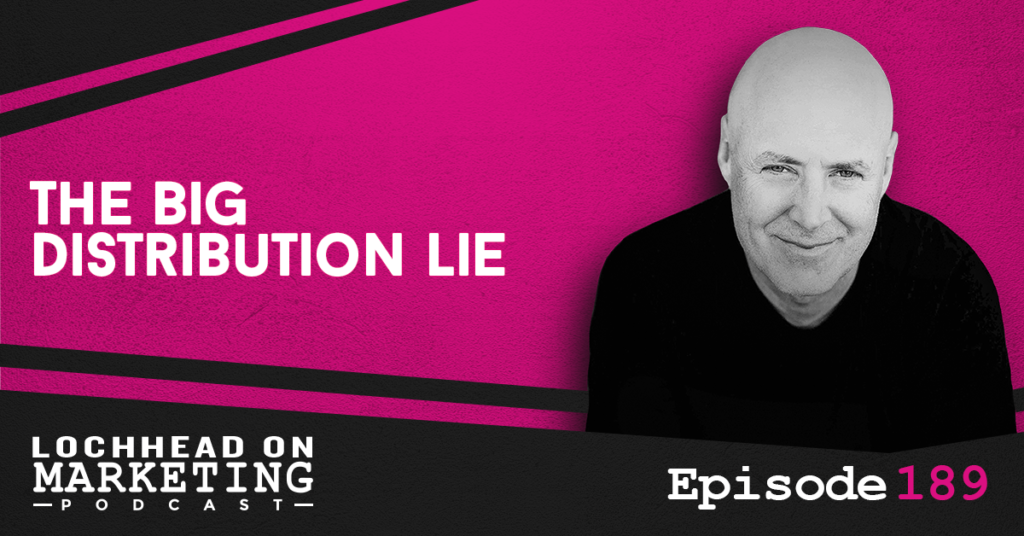
Podcast (lochheadonmarketing): Play in new window | Download (Duration: 7:07 — 4.9MB) | Embed
Subscribe: Apple Podcasts | Spotify | RSS | More
Happy new year to everyone, and we at Lochhead on Marketing hope that you’ve been having a good one so far. To start off the year, let us talk about the big Distribution Lie, why it is so, and what you really need for your new startup or project to make it big.
You see, in Silicon Valley, there has been an ever-increasingly large drumbeat that says the number one thing that a startup needs or that a new software launch of any kind needs is distribution. That if you can only get distribution, then you’d win, right? So, let’s test this.
Welcome to Lochhead on Marketing. The number one charting marketing podcast for marketers, category designers, and entrepreneurs with a different mind.
The Myth of Distribution as a Key to Success
For this discussion, let us use Google as an example. In 2018, Google launched Google Podcast as a competitor to the category king (Apple), and the current challenger (Spotify). On paper, Google Podcast should have the advantage: Google has a legendary distribution line with its 5 billion users and having a mailing and browsing platform that is widely popular worldwide.
And yet for some reason, Google Podcast is now at the brink of closing down in 2024. So why did it not beat out the category king, much less its challenger in this race?
Building the Category versus Muscling into the Market
Simply put, Google Podcast did not offer anything new that Apple Podcast or Spotify doesn’t already do. It was simply relying on the fact that on paper, it looks like the better product with a well-established distribution network to back it up.
Whereas Apple created the category, designed the space, and solved the “problem” that their product “solves”, thus cornering a big chunk of the market.
This is a mistake that happens over and over and over again, category design economics are clear, the company that designs the space is best positioned to dominate it and by dominated our primary research has shown that the company that designs the category, if they can execute over time, earns 76% of the total value created.
Doomed to Repeat Itself
Unfortunately, this is not the first time this has happened to Google. One big thing most people might remember is Google Plus, which was supposed to take down Facebook. And not only Google is susceptible to this, as different big tech companies have committed this mistake, because they believe they could just use their better distribution systems to take over a market, rather than creating their own to dominate.
So at the end of the day, no matter how good your product is, and how great your distribution advantage is: if you don’t design a new category, around a problem that matters to customers, it doesn’t matter how legendary your product is.
Bio
Don’t forget to grab a copy (or gift!) of one of our best-selling books:
Snow Leopard: How Legendary Writers Create A Category Of One
The Category Design Toolkit: Beyond Marketing: 15 Frameworks For Creating & Dominating Your Niche
A Marketer’s Guide To Category Design: How To Escape The “Better” Trap, Dam The Demand, And Launch A Lightning Strike Strategy
 The 22 Laws of Category Design: Name & Claim Your Niche, Share Your POV, And Move The World From Where It Is To Somewhere Different
The 22 Laws of Category Design: Name & Claim Your Niche, Share Your POV, And Move The World From Where It Is To Somewhere Different
We hope you enjoyed this episode of Lochhead on Marketing™! Christopher loves hearing from his listeners. Feel free to email him, connect on Facebook, Twitter, Instagram, and subscribe on iTunes!
188 A Wish for Different in 2024
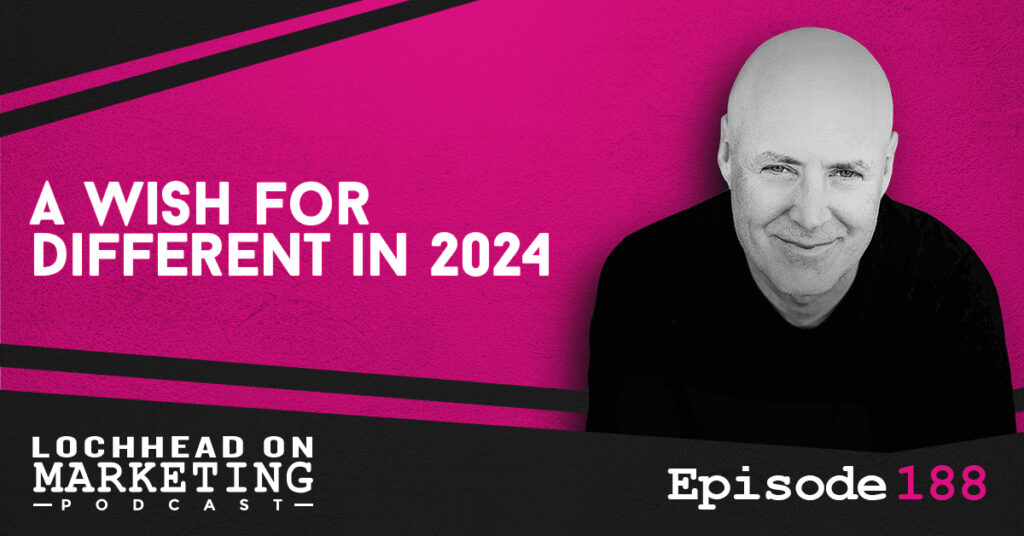
Podcast (lochheadonmarketing): Play in new window | Download (Duration: 45:45 — 31.4MB) | Embed
Subscribe: Apple Podcasts | Spotify | RSS | More
First and foremost, we at Lochhead on Marketing would like to wish everyone from the bottom of our hearts, happy holidays. Christopher Lochhead hopes that you have an opportunity to be with the people you love this time of year, and enjoy some happiness and peace.
That said, there seems to be a lot going on lately. Be it about antisemitism, diversity, equality, and inclusion, and sort of the core values that the United States will be governed by and will latch on to. So I wanted to take this time and have a talk between you and I.
You may not like what I will have to say, and that is all right. The important thing is that we have a good dialogue between us, and open ourselves to thinking Different does not always mean they hate you and your type of thinking.
As we head to 2024, that is my wish for the holiday season. That we have a breakthrough in real, authentic, civilized, thoughtful dialogue.
Welcome to Lochhead on Marketing. The number one charting marketing podcast for marketers, category designers, and entrepreneurs with a different mind.
Christopher Lochhead on LGBTQ+ rights over the years
Christopher shared a heartwarming story about a LinkedIn acquaintance, a marketing executive, who recently had a baby with her wife. They had a positive exchange about babies, and Christopher expressed genuine happiness for the couple.
“Around here, we think babies are fucking fantastic, especially when they’re born to good people who are committed to raising those children and loving knows children. What could be better than a great couple are a great group of folks who have a baby, love that baby, and do everything in their power to provide that child with a great life and enjoy that child. It’s wonderful.”
– Christopher Lochhead
Christopher then reflected on growing up around queer individuals, recalling the challenges they faced over the years. He emphasized the progress in societal acceptance of the queer community, highlighting the positive change that allows people to openly share personal milestones without fear of judgment.
That said, Christopher expressed joy for the LinkedIn acquaintance, appreciating that she can legally be herself and share her family news without hesitation, considering it a legendary step forward, especially in the United States.
Christopher Lochhead on mortgage discrimination
Christopher then talks about a CNN headline that revealed the systemic racism about the Navy Federal Credit Union’s discriminatory mortgage approval practices.
The report states that while over 75% of white applicants were approved for conventional home purchase mortgages, less than 50% of black applicants were approved under the same circumstances. Christopher condemns this as not just systemic racism but outright evil. He criticizes financial institutions like Wells Fargo for repeatedly facing charges related to racial discrimination without executives facing jail time. He emphasizes the urgent need to acknowledge and fight systemic racism for true equality and justice, citing the 14th Amendment of the US Constitution.
“This is racism right in front of us. And anybody who’s just anybody who cares about equality, and justice, and the pursuit of happiness for all must acknowledge that there is systemic racism against certain groups. There’s no doubt about that. And we need to fight it. We really need to fight it.”
– Christopher Lochhead
On Systemic Racism and DEI in society
Christopher expresses concern about the rise of hatred, particularly in the context of recent events, notably the conflict in the Middle East. He highlights the misunderstandings surrounding the October 7th events, emphasizing the severity of the situation and the explicit threat against Israel and the Jewish population.
Christopher is dismayed by the confusion and the lack of recognition for Israel’s right to defend itself. He shares a personal experience of a friend falling victim to violence and underscores the complexity of the situation, acknowledging the tragedy on both sides.
Christopher attributes the rise in hatred to the teachings of diversity, equity, and inclusion (DEI), which he suggests simplifies the world into oppressors and oppressed, fostering division and victimhood competitions rather than promoting genuine understanding and collaboration.
To hear more of Christopher Lochhead’s thoughts on 2023 and his wish for the coming year, download and listen to this episode.
Bio
Links
We hope you enjoyed this episode of Lochhead on Marketing™! Christopher loves hearing from his listeners. Feel free to email him, connect on Facebook, Twitter, Instagram, and subscribe on iTunes!
187 How To Become A Category Pirate | Christopher Lochhead on Lenny’s Podcast with Lenny Rachitsky
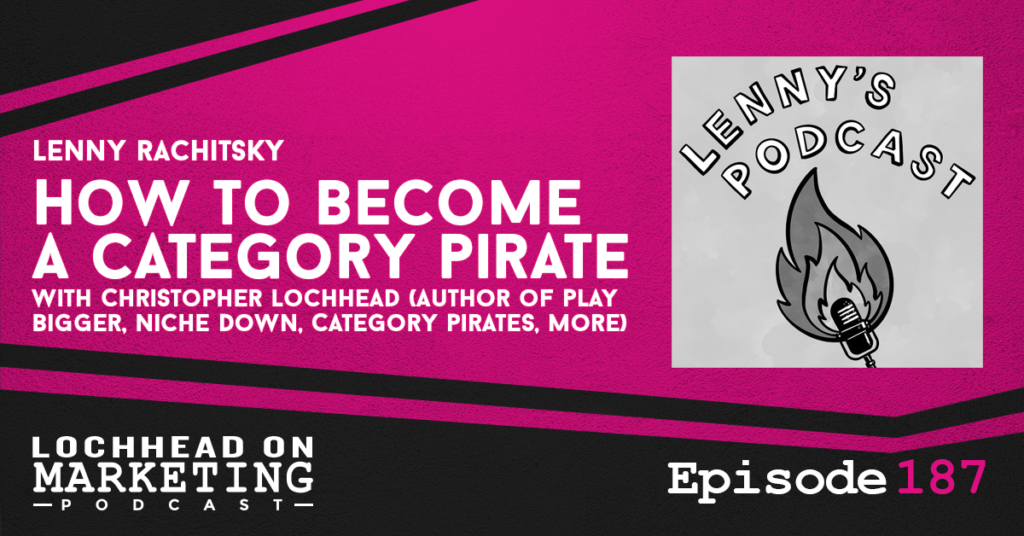
Podcast (lochheadonmarketing): Play in new window | Download (Duration: 1:48:49 — 74.7MB) | Embed
Subscribe: Apple Podcasts | Spotify | RSS | More
This week, we’re presenting to you Christopher Lochhead’s appearance on Lenny’s Podcast, hosted by Lenny Rachitsky.
Lenny Rachitsky runs the #1 Business Substack newsletter, Lenny’s Newsletter. It is legendary especially for people in tech marketing, product marketing, and startups. It’s so legendary that even Christopher pays for it. And now, he’s in it.
This is one of the more in-depth discussions Christopher has had with a very smart person about category design in a while. So settle in for a good listen and great lesson about category design.
Welcome to Lochhead on Marketing. The number one charting marketing podcast for marketers, category designers, and entrepreneurs with a different mind.
On taking the Good with the Bad
Lenny starts off the conversation by showing appreciation to Christopher’s extensive work, and jokingly adds that it was challenging to prepare for their conversation due to his numerous podcasts, books, and other content.
That said, Lenny noticed Christopher’s website displayed negative reviews prominently. When asked about it, Christopher explained his approach with humor, calling his team Category Pirates and embracing criticism. He believed it was essential for innovators not to fear criticism, citing examples of famous artists and musicians who faced initial negativity. Christopher displayed negative feedback to show the reality of creative work and to remind people not to take themselves too seriously.
Lenny admired Christopher’s ability to handle criticism and expressed the desire to adopt a similar mindset.
Lenny Rachitsky on how Lenny’s Newsletter came to be
Christopher Lochhead expressed admiration for Lenny’s branding choices, appreciating the simplicity of just being called “Lenny.” He found it endearing and highlighted that Lenny’s authenticity stood out in a world where many influencers create an aura of superiority.
Lenny shared that the name “Lenny’s Newsletter” was a default suggestion from Substack, and he never intended it to be a long-term commitment. Similarly, he struggled to find a different name for his podcast, wanting to avoid a self-centered approach.
But despite having his name in the branding, Christopher noted the content wasn’t self-centered; instead, it reflected Lenny’s genuine approach, unlike influencers who focus on creating envy. They both appreciated the authenticity in Lenny’s approach.
Lenny Rachitsky and Christopher Lochhead talk Category Creation
Lenny asked Christopher about category creation, a concept Christopher has championed over competition in existing markets.
Christopher explained how most people aim to compete by offering a better product or service in an existing category. However, legendary innovators don’t follow this path. They create entirely new categories, defining unique problems and solutions. Christopher emphasized that a single company in a category usually captures two-thirds of the market value, making category creation a lucrative strategy.
He cited Gojo Industries, creators of Purell, as an example. They didn’t just invent hand sanitizer; they redefined the problem of hand cleanliness, leading to a new market category. Christopher stressed the importance of focusing on problem-solving rather than just product features, making one’s brand irreplaceable in customers’ minds. He contrasted this approach with typical marketing, where companies invite comparison, emphasizing the power of radical differentiation and being a category creator.
To hear more about Christopher’s conversation with Lenny Rachitsky on Category Creation, download and listen to this episode.
If you want to learn more about Lenny Rachitsky, check out his Newsletter and Podcast at LennyRachitsky.com.
Don’t forget to grab a copy (or gift!) of one of our best-selling books:
Snow Leopard: How Legendary Writers Create A Category Of One
The Category Design Toolkit: Beyond Marketing: 15 Frameworks For Creating & Dominating Your Niche
A Marketer’s Guide To Category Design: How To Escape The “Better” Trap, Dam The Demand, And Launch A Lightning Strike Strategy
 The 22 Laws of Category Design: Name & Claim Your Niche, Share Your POV, And Move The World From Where It Is To Somewhere Different
The 22 Laws of Category Design: Name & Claim Your Niche, Share Your POV, And Move The World From Where It Is To Somewhere Different
We hope you enjoyed this episode of Lochhead on Marketing™! Christopher loves hearing from his listeners. Feel free to email him, connect on Facebook, Twitter, Instagram, and subscribe on iTunes!
186 Israel: War in “Startup Nation”
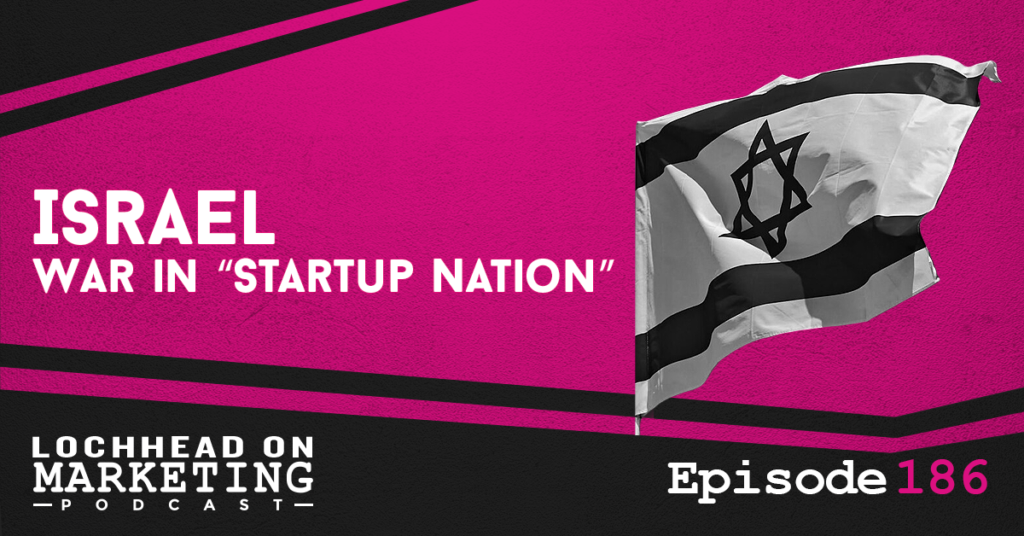
Podcast (lochheadonmarketing): Play in new window | Download (Duration: 11:23 — 7.8MB) | Embed
Subscribe: Apple Podcasts | Spotify | RSS | More
On this episode, let’s talk about Israel, and the war that has come to this “Startup Nation”.
Off the top, let me say the pain and suffering of what’s happening is unbelievable, unbearable. My heart goes out to Israel, all Israelis, and all Jews around the world.
I also want to say I have spoken with many Arabs since this happened. There’s a very big difference between an Arab or a Palestinian and Hamas. They are not the same thing. My Arab friends wanted to stress that to me. My heart goes out to all the innocent Arabs in Gaza and in the region who are suffering and also experiencing extraordinary pain and loss.
Israel is a “Startup Nation”
If you’ve been in tech for a while, you’ve probably worked with Israelis. For the better part of my professional life, I’ve worked with entrepreneurs, engineers and executives from the country.
The Israeli’s I know are smart, tough, driven, no-nonsense result producers. If you want to get big tech shit done, work with Israelis.
It has one of the highest concentrations of startups in the world. Its tech sector is a major contributor to the country’s economy. Tech is 18% of Israel’s GDP, and 14% of all salaried employees work in Tech. That’s roughly 500,000 people. On top of which, 50% of Israel’s total exports come from Technology developed by these people.
The framework Israelis created to co-locate Israel/US tech startups, established an innovation model that is envied the world over.
Israel has over 6,000 Tech Companies
The impact of this war borne out by the Israeli people.
Reports indicate that the start if this war was “the darkest day in Jewish history since the end of the Holocaust.”
And, it will also be felt by virtually every major tech company in the world.
There are over 6,000 tech companies operating in Israel, including some of the largest names, with Apple, Microsoft, Google, and Intel to name a few. These companies have a variety of strategic operations in Israel, including research and development centers, sales offices, and customer support centers.
Israel is home to over 15,000 startups, and they employ over 100,000 people. In 2021, Israeli tech companies raised a record $25.6 billion in venture capital funding.
Today, they are scrambling to secure and support their people.
15,000 Israeli Tech Startups
Now, this evil war is extracting an unbearable human cost. More death, suffering and disruption is sure to follow. And this war will be felt by many of us in the tech industry.
My heart aches for Israel.
My heart aches for all of the innocent souls in the Middle East.
We’re praying for peace, and the day we can all get back to building legendary companies.
To hear more of Christopher Lochhead’s thoughts on the recent events that unfolded in Israel, download and listen to this episode.
If you wish to join the conversation and get more information on the matter, check out Christopher’s post on LinkedIn:
We hope you enjoyed this episode of Lochhead on Marketing™! Christopher loves hearing from his listeners. Feel free to email him, connect on Facebook, Twitter, Instagram, and subscribe on iTunes!
185 Where Is Consumer Spending Heading? | Pirates Perspective
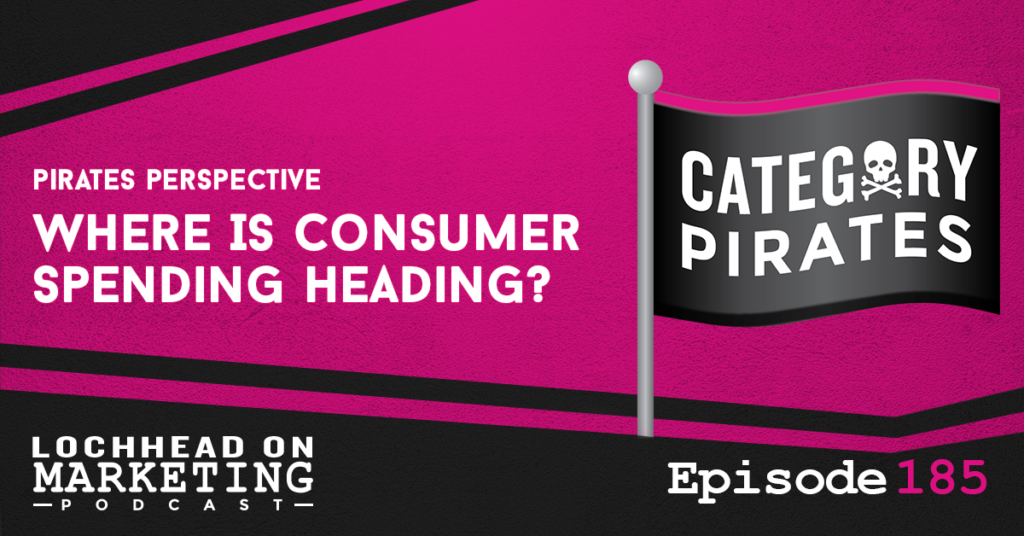
Podcast (lochheadonmarketing): Play in new window | Download (Duration: 18:22 — 12.6MB) | Embed
Subscribe: Apple Podcasts | Spotify | RSS | More
On this episode of Lochhead on Marketing, we are presenting some Pirates Perspective from our newsletter, Category Pirates about consumer spending trends.
Eddie Yoon, Christopher Lochhead and Katrina Kirsch of Category Pirates discuss the latest consumer spending reports and what they mean for the retail category and retail category queens. They also dive into a category opportunity for McDonalds and how it could impact the future of food delivery.
Welcome to Lochhead on Marketing. The number one charting marketing podcast for marketers, category designers, and entrepreneurs with a different mind.
The Changing Retail Landscape
Eddie Yoon examines the evolving economic landscape and its impact on U.S. consumers. Employing a Category Science lens, Eddie highlights significant disparities in economic indicators. Disposable personal income in July saw a mere 0.15% uptick, the year’s lowest, while personal consumption expenditures (PCE) surged by 0.82%, marking a 2023 high. This income-spending disconnect raises concerns.
Eddie notes the imminent return of student loan payments, averaging $503 per month, which may strain disposable income. Loan delinquencies, nearing 2020 levels, signal financial challenges. Notably, a fourfold increase in young adults aged 25 to 34 living with parents since the 1960s reflects economic constraints driving lifestyle changes.
Prompted by Christopher, Eddie also identifies two contrasting trends: robust growth in experiences and personal transformations versus declining interest in traditional goods. While international travel and categories like medical aesthetics flourish, traditional retailers like Target, Kroger, and Home Depot report declining revenues. Eddie predicts a future marked by consolidation and M&A, with only a select few brands and private labels surviving.
Navigating the Shifting Consumer-Driven Economy
Christopher Lochhead and Eddie Yoon then tackle the intriguing dual signals in the economy, driven by increasing digital influence on consumer behavior. On one hand, positive indicators suggest the American consumer remains a key economic driver, with retail sales growing by 0.6% in August and a forecasted real GDP growth of 3.5% for the third quarter.
However, Eddie Yoon emphasizes the underlying shifts: Consumers are driving economic growth through increased credit spending, but it raises questions about sustainability. Many are making significant changes in their financial habits, including declining college enrollments, reduced home purchases, and a lower birth rate, all contributing to a redefined economic landscape.
The trend toward single-person households, now at 29%, signifies a fundamental shift in the traditional nuclear household model. While the macroeconomic picture may still appear positive, these changes point to a significant remaking of the American economy, shaped by evolving consumer preferences influenced by digital transformations.
McDonald’s Dilemma
Christopher and Eddie then discuss McDonald’s recent announcement to phase out fountain drinks inside their stores by 2032, which highlights a significant shift in consumer behavior. Currently, 40% of their revenue is generated through app purchases, delivery, and drive-thru, indicating a decline in physical store visits. This trend reflects the changing preferences of Native Digitals, who prefer digital-first experiences and the conveniences they bring.
As consumers become more discerning and value experiences over material possessions, businesses need to adapt to these mega trends. Eddie Yoon points out that while some trends are favorable, like digital and app-focused sales, the shift in product mix poses challenges. McDonald’s heavily relies on the profitability of fountain drinks, which drive a substantial portion of their margins. However, the convenience of home beverages and changing consumer preferences may lead to a decline in the sale of large-size drinks at McDonald’s, impacting their profitability in this area.
To learn more about the Pirates’ solution to McDonald’s dilemma and more on consumer spending trends, download and listen to the episode. If you want to join in the discussion, subscribe to Category Pirates and find more Pirates Perspective buried around the beach.
Don’t forget to grab a copy (or gift!) of one of our best-selling books:
Snow Leopard: How Legendary Writers Create A Category Of One
The Category Design Toolkit: Beyond Marketing: 15 Frameworks For Creating & Dominating Your Niche
A Marketer’s Guide To Category Design: How To Escape The “Better” Trap, Dam The Demand, And Launch A Lightning Strike Strategy
 The 22 Laws of Category Design: Name & Claim Your Niche, Share Your POV, And Move The World From Where It Is To Somewhere Different
The 22 Laws of Category Design: Name & Claim Your Niche, Share Your POV, And Move The World From Where It Is To Somewhere Different
We hope you enjoyed this episode of Lochhead on Marketing™! Christopher loves hearing from his listeners. Feel free to email him, connect on Facebook, Twitter, Instagram, and subscribe on iTunes!
184 Building Your Digital Reputation with Josh Greene, CEO of The Mather Group
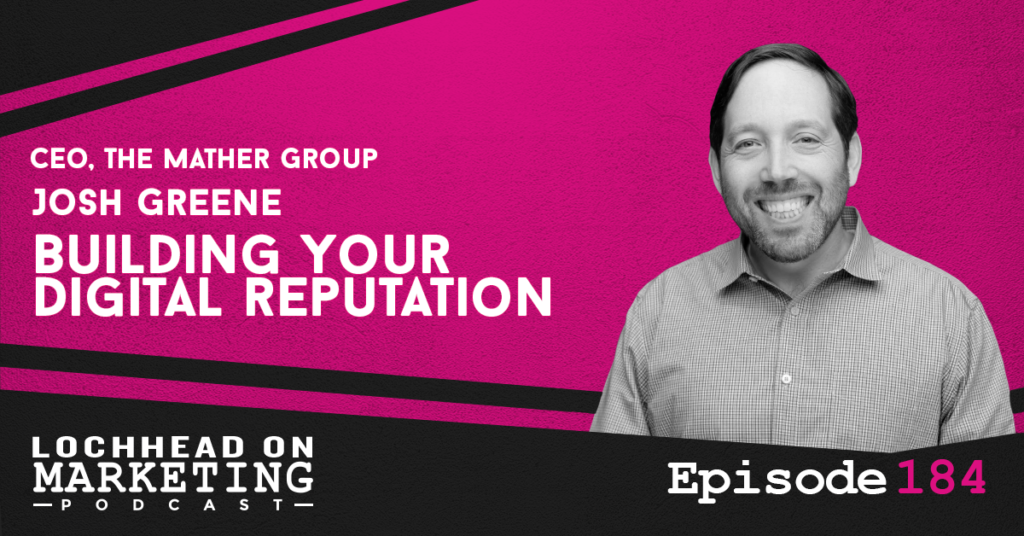
Podcast (lochheadonmarketing): Play in new window | Download (Duration: 1:09:33 — 47.8MB) | Embed
Subscribe: Apple Podcasts | Spotify | RSS | More
On this episode, we have a powerful dialogue with our guest, Josh Greene about what it really takes to build your reputation online and do legendary marketing in the digital world.
Josh Greene is the CEO of The Mather Group. In a world of digital marketing BS, sophomores hacks and self-congratulatory vanity metrics, Josh is the real deal.
Welcome to Lochhead on Marketing. The number one charting marketing podcast for marketers, category designers, and entrepreneurs with a different mind.
Josh Greene on Marketing and Reputation Management
The episode starts off with a discussion about marketing trends and reputation management with Josh Greene. They touch upon the impact of AI on marketing strategies and delve into reputation management techniques. Christopher highlights how individuals with negative reputations try to bury their past misdeeds in online search results. Josh explains that reputation management involves manipulating search engine rankings to push down negative content and make it less visible, while at the same time providing more positive information about you or your company.
They also touch on the evolving landscape of SEO (Search Engine Optimization), with Josh emphasizing that SEO is not dead but constantly changing. He notes that traditional SEO tactics, such as keyword optimization, have evolved due to changes in Google’s algorithms and the increasing importance of AI-driven queries.
Josh Greene on what is the Internet thinking about you
They also discuss the topic of the evolving landscape of SEO and the impact of AI, particularly in large language models like ChatGPT and Bard. As mentioned earlier, Josh highlights how SEO has evolved beyond optimizing for Google to also include considerations for AI-driven queries. He then emphasizes the importance of managing one’s online reputation in this context.
On the topic of AI, Christopher shares his experience with ChatGPT, mentioning how it produced relevant results related to category design, which led him to ponder the connection between AI training data, the internet’s content, and these AI models’ abilities to provide meaningful information. He also mentions that experts in various fields, including category design, are actively teaching AI models to enhance their understanding and capabilities.
Josh Green on how to stand out from the crowd
They then discuss how to stand out in the digital landscape, particularly in the context of AI and SEO. Josh explains that AI models like those used by Google rely on credible sources, with Wikipedia and Google’s patent tool being primary sources. He emphasizes that credibility, links, and signals play a significant role in determining the relevance of content for AI models. Much like in SEO, authoritative content with strong signals will have a more substantial impact.
Christopher adds that AI is evolving similarly to SEO and mentions that some individuals are already trying to exploit AI for personal gain by selling courses on how to manipulate AI models. He highlights the importance of providing valuable content to help people rather than merely trying to stay ahead of trends or exploit emerging technologies.
They both agree that the key to success in the digital age, whether in AI or SEO, is delivering valuable content and expertise to genuinely assist others rather than chasing quick fixes or trends promoted by self-proclaimed gurus. They also note that having a real impact requires substance and credibility, not just buzzwords.
To hear more from Josh Greene and on how you can build your online reputation, download and listen to this episode.
Bio
Links
Connect with Josh Greene!
We hope you enjoyed this episode of Lochhead on Marketing™! Christopher loves hearing from his listeners. Feel free to email him, connect on Facebook, Twitter, Instagram, and subscribe on iTunes!
183 What Barbie Can Teach Tech CEOs About Marketing
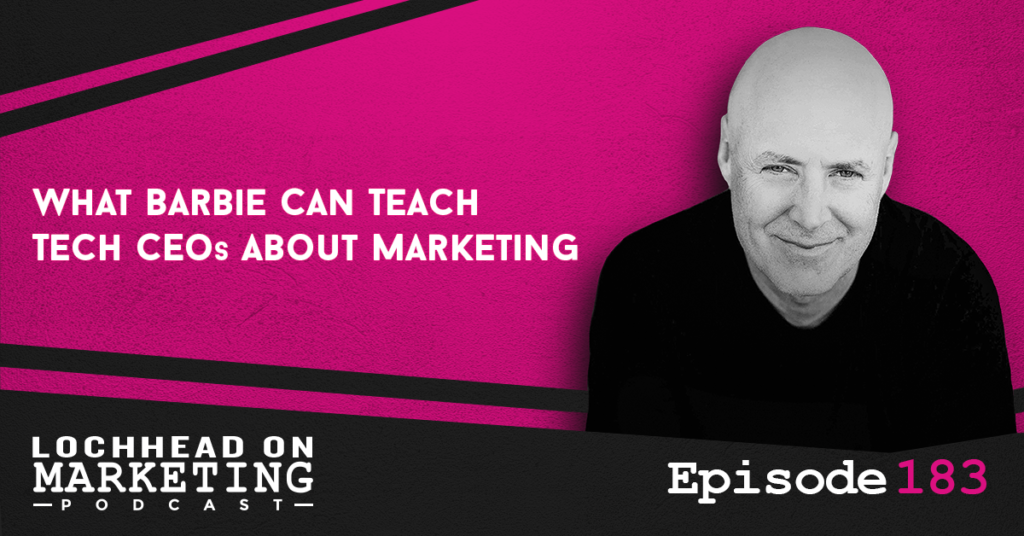
Podcast (lochheadonmarketing): Play in new window | Download (Duration: 8:05 — 5.5MB) | Embed
Subscribe: Apple Podcasts | Spotify | RSS | More
On this episode of Lochhead on Marketing, let’s take a look on what the movie Barbie did to reach such an overwhelming success, and what Tech CEOs can learn about their approach to marketing.
Welcome to Lochhead on Marketing. The number one charting marketing podcast for marketers, category designers, and entrepreneurs with a different mind.
Barbie’s Approach to Marketing
Christopher Lochhead opens up the dialogue with pointing out the things that the Barbie producers did that made it a blockbuster win, particularly with what they did on the marketing side. According to Christopher, Barbie pulled off the greatest “lightning strike” framework of any brand in 2023.
One of the notable things that stood out was that Barbie spent $145M on producing the film, while spending almost $150M on marketing.
Let that sink in: $145M to make it, $150M to build it up.
Most companies would consider it outrageous to do such a thing, opting to focus their resources on building the product and spending what’s left on marketing, if any. And this is why most of those companies fail to make a mark and carve out a market early on in their product’s lifecycle.
How about Barbie? Well, it spent a combined $295M, but that marketing approach resulted in $1B in sales. $145M to make it, $150M to build. $1B in revenue.
Barbie’s Missed Opportunity
That said, Christopher did point out a few missed avenues that Barbie could’ve made to take advantage of their marketing strategy. For one thing, they left the digital space widely untapped, spawning newsletters and enticing new generations of girls to getting into collecting Barbies and other related merchandise.
Another thing they could’ve done is get older fans together and start building out a community in the digital sphere and talk all things Barbie. Not only does it heavily hit people in their nostalgia, but it can also help expose those older generation’s children into Barbie, and then you are back to point no. 1.
The Recession that Never Came
One of the things that Christopher also noticed with Barbie’s approach is that people are still bracing for a recession that seemingly never came, or at least was not as full-blown as we were expecting it to be. While everyone else was still timidly testing the waters, Barbie decided it would make a big splash instead.
So for Tech CEOs out there, it may not be the time to be holding down the fort. Rather, it should be a good time to try and hurl some lightning strikes in the market and see if you strike gold.
To hear more about Christopher Lochhead’s views on Barbie’s success and how it can teach tech CEOS about marketing, download and listen to this episode.
Bio
Christopher Lochhead is a #1 Apple podcaster and #1 Amazon bestselling co-author of books: Niche Down and Play Bigger.
He has been an advisor to over 50 venture-backed startups; a former three-time Silicon Valley public company CMO and an entrepreneur.
Furthermore, he has been called “one of the best minds in marketing” by The Marketing Journal, a “Human Exclamation Point” by Fast Company, a “quasar” by NBA legend Bill Walton and “off-putting to some” by The Economist.
In addition, he served as a chief marketing officer of software juggernaut Mercury Interactive. Hewlett-Packard acquired the company in 2006, for $4.5 billion.
He also co-founded the marketing consulting firm LOCHHEAD; the founding CMO of Internet consulting firm Scient, and served as head of marketing at the CRM software firm Vantive.
Don’t forget to grab a copy (or gift!) of one of our best-selling books:
Snow Leopard: How Legendary Writers Create A Category Of One
The Category Design Toolkit: Beyond Marketing: 15 Frameworks For Creating & Dominating Your Niche
A Marketer’s Guide To Category Design: How To Escape The “Better” Trap, Dam The Demand, And Launch A Lightning Strike Strategy
 The 22 Laws of Category Design: Name & Claim Your Niche, Share Your POV, And Move The World From Where It Is To Somewhere Different
The 22 Laws of Category Design: Name & Claim Your Niche, Share Your POV, And Move The World From Where It Is To Somewhere Different
We hope you enjoyed this episode of Lochhead on Marketing™! Christopher loves hearing from his listeners. Feel free to email him, connect on Facebook, Twitter, Instagram, and subscribe on iTunes!
182 Is Twitter’s Rebrand to X a Category Design Play? | Pirates Perspective
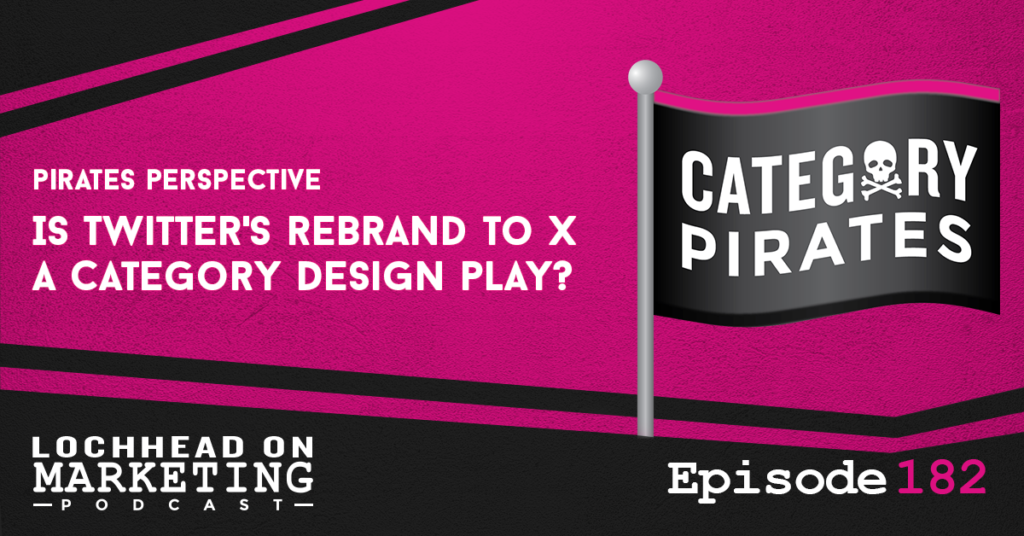
Podcast (lochheadonmarketing): Play in new window | Download (Duration: 17:26 — 12.0MB) | Embed
Subscribe: Apple Podcasts | Spotify | RSS | More
On this episode of Lochhead on Marketing, we are presenting some Pirates Perspective from our newsletter, Category Pirates.
Eddie Yoon, Christopher Lochhead and Katrina Kirsch of Category Pirates discuss Elon Musk’s recent move to rebrand Twitter to X. They also speculate why Elon made such a move, and what he could have done from a category design perspective.
Welcome to Lochhead on Marketing. The number one charting marketing podcast for marketers, category designers, and entrepreneurs with a different mind.
Twitter to X
Elon Musk’s choice to rename Twitter as X has left people puzzled, questioning why he would give up a well-known brand and introduce a new one. Katrina follows up that the others think the move might be aimed at entering a different category, possibly related to financing. She wonders whether it would have been wiser to create a new company instead of rebranding Twitter.
Eddie Yoon discusses the debate surrounding the cost of rebranding and the value of legacy brand identity. He highlights that classic economic theory suggests ignoring sunk costs, which are expenses from the past, and instead focusing on future opportunities.
Eddie mentions that while some argue against rebranding due to the value of Twitter’s legacy brand, most consumers prioritize what a brand can offer them in the future rather than its past reputation. He suggests that rebranding can make sense when a company wants to enter new categories and emphasizes the importance of looking towards future opportunities rather than dwelling on the past. In Musk’s case, he’s not banking on the legacy of the brand itself, but the established userbase that Twitter has, who have a high potential of also buying in to what new category Twitter, now X, might become.
Elon Musk’s Mistake with the rebrand
While Christopher Lochhead agrees with Eddie Yoon’s points, he also believes that Elon Musk made a mistake by rebranding Twitter without clearly unveiling his vision for the new category of service he wants to create. He argues that a rebrand should be part of a strategic launch of a new category and not just a standalone action. The value of a brand lies in its perceived leadership in a relevant category, and in this case, the microblogging category may not be as impactful as before.
Although Elon Musk’s approach might not align with the ideal category design strategy, his reputation and influence will likely still garner attention when he eventually presents his big vision for the new category. But it definitely will lose some steam because the rebrand has become open to interpretation, rather than being focused on the intended category creation.
X as a financial category
The three further discuss the possibility of X creating a new currency or incorporating cryptocurrencies into its platform. Eddie mentions that X is already experiencing a shift in money flow, with revenue coming from both advertisers and users.
They also speculate that Elon Musk might have plans to introduce financial services or a new token (X token) on Twitter/X, incentivizing creators and potentially offering various payment options, including cryptocurrency. They compare this potential move to American Airlines’ frequent flyer program, which essentially created a currency in the form of loyalty points.
While they acknowledge they don’t have insider information, they highlight that Musk’s background with PayPal and his desire to make X a vital part of everyone’s life might lead to interesting developments.
To hear more about the discussion on what Elon plans to do with X, download and listen to this episode. If you want to join in the discussion, subscribe to Category Pirates and find more Pirates Perspective buried around the beach.
Don’t forget to grab a copy (or gift!) of one of our best-selling books:
Snow Leopard: How Legendary Writers Create A Category Of One
The Category Design Toolkit: Beyond Marketing: 15 Frameworks For Creating & Dominating Your Niche
A Marketer’s Guide To Category Design: How To Escape The “Better” Trap, Dam The Demand, And Launch A Lightning Strike Strategy
 The 22 Laws of Category Design: Name & Claim Your Niche, Share Your POV, And Move The World From Where It Is To Somewhere Different
The 22 Laws of Category Design: Name & Claim Your Niche, Share Your POV, And Move The World From Where It Is To Somewhere Different
We hope you enjoyed this episode of Lochhead on Marketing™! Christopher loves hearing from his listeners. Feel free to email him, connect on Facebook, Twitter, Instagram, and subscribe on iTunes!
181 My First Year As A Category Designer with Mike Bruno of Play Bigger
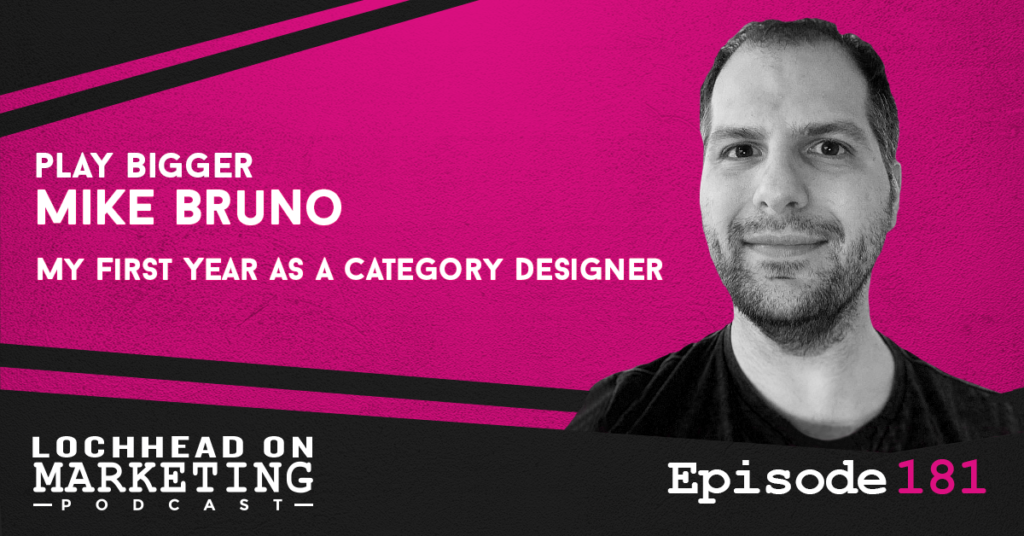
Podcast (lochheadonmarketing): Play in new window | Download (Duration: 1:07:43 — 46.5MB) | Embed
Subscribe: Apple Podcasts | Spotify | RSS | More
On this episode, we welcome Mike Bruno, Senior Category Designer at Play Bigger. Today, we dig into what it takes to make Category Design your career, and how incredible it is working with some of the most advanced technology companies in the world on category design.
Welcome to Lochhead on Marketing. The number one charting marketing podcast for marketers, category designers, and entrepreneurs with a different mind.
Mike Bruno and his first year as a Category Designer
Mike, who has been a category designer for about a year and a half, started his career working in agencies and social advertising. Transitioning into category design was a return to a beginner mindset for him, which he found interesting. In his previous role, he helped people solve problems and develop strategies based on business objectives and existing products. This experience translated well to category design, where the front door is identifying the problem that the category solves uniquely.
Mike also mentioned that category design involves many new concepts and a broader aperture, as it requires structuring not only the client’s business but also influencing the entire market. While it was a humbling experience trying to figure it all out, he also had a sense of familiarity, knowing how to approach problems and strategize effectively.
Overall, his first year as a category designer was challenging and exciting, with a mix of the familiar and the new, which kept him engaged and interested in the field.
The way people think about Category Design
Christopher and Mike discuss the challenges of transitioning from traditional marketing to category design. They emphasize that category design involves creating new markets rather than catching existing demand. Mike points out that realizing someone invented categories was a facepalm moment for him, but it made him realize the importance of solving unsolved problems.
Christopher and Mike also talked about the power of not doing anything, meaning finding a category that has already been solved, and how this is often underestimated in the business world. They use Apple’s example of launching a new category called “spatial computing” instead of just a new product like most marketers do. They compare it to Magic Leap, which failed to create a category despite having inspiring visions. Mike believes Apple succeeded because they could bridge the gap between their vision and the technology needed to achieve it.
Mike Bruno on the Difference between Category Design and Product Design
Christopher and Mike discuss the difference between launching a product and category designing a market category. They use the example of Magic Leap, which had a product but failed to category design the spatial computing market. Christopher explains that category design involves framing, naming, and claiming a new problem, creating an ecosystem of partners to solve that problem, and evangelizing the solution.
Mike shares his surprise about the comprehensive nature of category design, realizing that it’s not just about coming up with a new term but involves a rigorous process to make the category successful. They also mention Apple’s success in category designing the spatial computing market, positioning themselves for significant market cap growth while other players who only launched products may miss out on the opportunity.
To hear more from Mike Bruno and his experiences as a Category Designer, download and listen to this episode.
Bio
Mike Bruno
Mike is a Senior Category Designer with a background in psychology and communications strategy. He finds hidden problems and unspoken truths, and connects those with companies, brands and products to drive businesses and, importantly, the people they serve.
Mike’s style of Category Design is simple, straightforward and playful. His work is equally influenced by the behavioral sciences, business theory and imagination. Carl Jung on one shoulder, and Dav Pilkey on the other.
Mike’s work has been featured in Advertising Age’s “Book of Tens”, has been awarded numerous industry accolades and has driven double digit brand growth for dozens of clients. Outside of work, Mike is a frequent guest lecturer at NYU and The New School, a hockey coach to five-year-olds, and a father of two boys. He lives in Westchester, NY with his wife, kids and backyard ice rink.
Don’t forget to grab a copy (or gift!) of one of our best-selling books:
Snow Leopard: How Legendary Writers Create A Category Of One
The Category Design Toolkit: Beyond Marketing: 15 Frameworks For Creating & Dominating Your Niche
A Marketer’s Guide To Category Design: How To Escape The “Better” Trap, Dam The Demand, And Launch A Lightning Strike Strategy
 The 22 Laws of Category Design: Name & Claim Your Niche, Share Your POV, And Move The World From Where It Is To Somewhere Different
The 22 Laws of Category Design: Name & Claim Your Niche, Share Your POV, And Move The World From Where It Is To Somewhere Different
We hope you enjoyed this episode of Lochhead on Marketing™! Christopher loves hearing from his listeners. Feel free to email him, connect on Facebook, Twitter, Instagram, and subscribe on iTunes!

